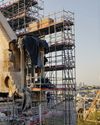
ON THE 8TH OF OCTOBER 2020, even as much of the rest of the world stayed locked down against the devastating first wave of the global COVID-19 pandemic, the Louisiana Museum of Modern Art in Copenhagen proceeded with opening "Taking Time", its retrospective of the remarkable oeuvre of Berlin-based architect Anupama Kundoo.
In their foreword to the book accompanying the exhibition, museum director Poul Erik Tøjner and curators Kjeld Kjeldsen and Mette Marie Kallehauge posed an elemental question: "How can architecture help solve the social, environmental, and economic crises that the world is facing?" They noted the industrial age established “time as a yardstick", which resulted in the hasty "creation of thousands of mediocre buildings around the world". But here was an alternate way of thinking: “Kundoo tries to return qualitative time to the production of architecture-by human work and human hand, which naturally takes longer than machines but involves a far better sense of materials, detail, space, and the building's relationship to the site."
"Taking Time" was a thunderclap of a turning point for Anupama Kundoo, and unleashed a cascade of honours. In May 2021, she was awarded the Auguste Perret Prize for Technology from the International Union of Architects "for her innovative use of local building techniques, material sourcing, and construction principles, all the while being acutely responsive to the environment, climate, and culture". Just a few weeks later, the Royal Institute of British Architects gave her the 2021 Charles Jencks award for "significant contributions to the theory and practice of architecture".
This story is from the {{IssueName}} edition of {{MagazineName}}.
Start your 7-day Magzter GOLD free trial to access thousands of curated premium stories, and 9,000+ magazines and newspapers.
Already a subscriber ? Sign In
This story is from the {{IssueName}} edition of {{MagazineName}}.
Start your 7-day Magzter GOLD free trial to access thousands of curated premium stories, and 9,000+ magazines and newspapers.
Already a subscriber? Sign In

The 30 Best Watches Of 2024
Rounding up the best shapes, materials, complications and sizes from this year's horological novelty treasure chest.

Wes Lang's Heroes of Love...
Last month, LA-based artist Wes Lang unveiled The Black Paintings, a monumental series of works that play like storyboards to a raucous midnight horror movieand a spiritual quest. Here, GQ collaborates with the artist on a fashion story that brings his stylish characters off the canvas.

The Miraculous Resurrection of Notre Dame
In 2019, a fire nearly destroyed the crown jewel of France-and the nation set a breakneck five-year deadline to bring it back from the ashes. This is the story of how an army of artisans turned back centuries to restore Notre-Dame by hand, and wound up reviving something even greater than the cathedral itself.

"IT'S NOT ABOUT BEING PERFECT. IT'S ABOUT BEING REVOLUTIONARY."
Beyoncé Knowles-Carter talks business, legacy, art, and family

The Wedding Singers
Madboy Mink's dynamic duo, Saba Azad and Imaad Shah, redefine festive style.

A Watch Is More Than Just a Pretty Face
As collectors look to make their grail watches stand out, they're turning to unique vintage bracelets and paying thousands on thousands for straps on the secondary market.

The Fluidity of Cartier
Why Gen Z stars are obsessed with this historic maison.

A Princess with Passion
From restoring monuments to reviving hereditary crafts, Bhavnagar's Brijeshwari Kumari Gohil has her sights on the future.

THE FUTURE SOUNDS LIKE AT EEZ
The Coachella-slaying, multi-language-singing, genre-obliterating members of Ateez are quickly becoming load-bearing stars of our global pop universe.

DEMNA UNMASKED
He's the most influential designer of the past decade. He's also the most controversial. Now the creative director of Balenciaga is exploring a surprising source of inspiration: happiness. GQ's Samuel Hine witnesses the dawn of Demna's new era, in Paris, New York, and Shanghai. Photographs by Jason Nocito.